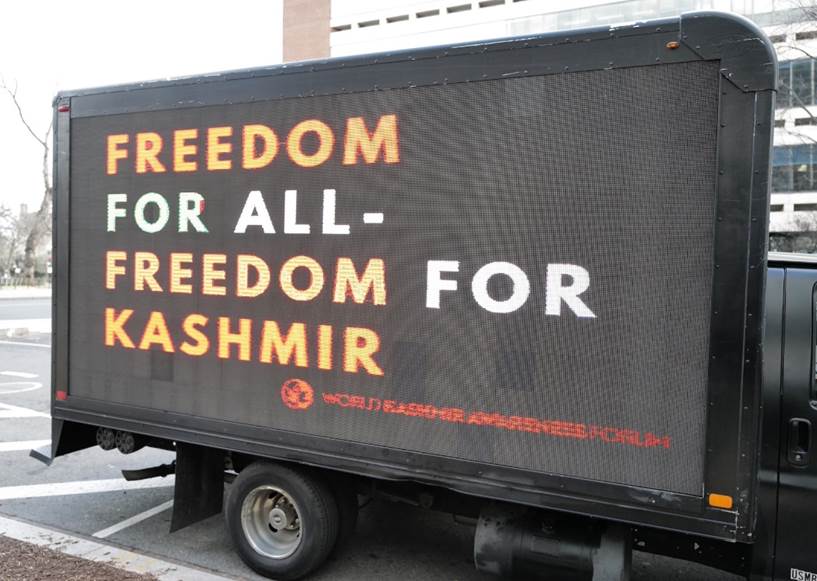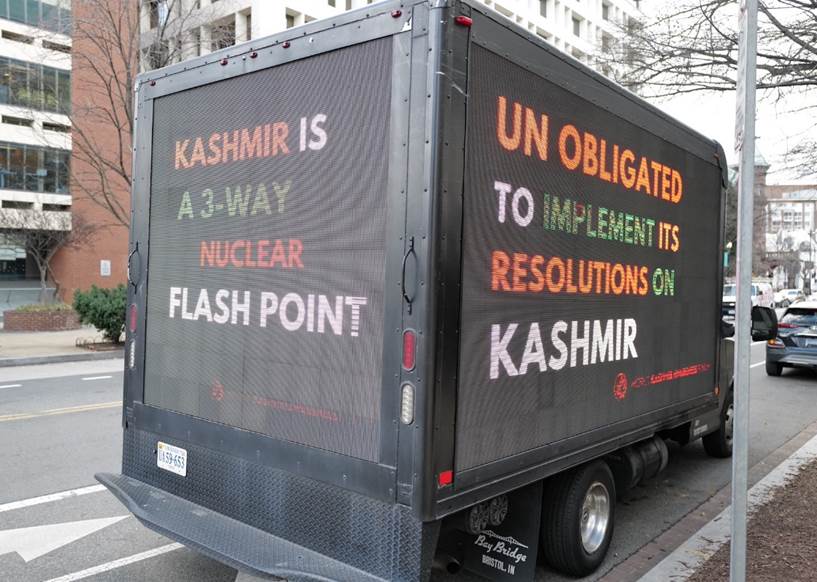

Kashmiris Still Waiting for Self-Determination
By Elaine Pasquini
Photos by Phil Pasquini

|
Washington: Since the partition of British India in 1947, India and Pakistan have fought three wars over Kashmir, the Muslim majority northern Himalayan state.
India controls approximately 55 percent of the area of the region that includes Jammu, the Kashmir Valley and most of Ladakh – regions which represent approximately 70 percent of the population. Pakistan administers the states of Azad Kashmir and Gilgit-Baltistan. And China is in an ongoing dispute with India over the Aksai Chin region along with the Trans-Karakoram Tract and Demchok sector.
After partition, Kashmir was semi-autonomous, although administered by India from 1952 until Aug 5, 2019, when Indian Prime Minister Narendra Modi’s ruling Bharatiya Janata Party (BJP) revoked Article 370 of India’s constitution, which provided Kashmir its special autonomous status. India deployed tens of thousands of troops to the region, enforced curfews, made random mass arrests and placed other restrictions on the rights of Kashmiris. One problem for Kashmiris has been the blocking of their social media and internet accounts by India’s Hindu nationalist-led government.
“India has systematically used arbitrary and preventive detentions to politically repress the people of the region and commit collective punishment on the population in complete disregard for the norms of international law,” Stand With Kashmir stated in its December blog. “These measures are taken against a population that has been demanding its right to self-determination since 1947 mandated by several UN Security Council Resolutions.”
Founded in February 2019, Stand With Kashmir is a Kashmiri diaspora-driven independent, transnational, grassroots movement committed to standing in solidarity with the 13 million people of Indian-occupied Jammu, Kashmir, and Ladakh in ending the illegal Indian occupation of their homeland. The group supports the right to self-determination of the pre-partition state of Jammu and Kashmir. Since last year, the social media pages and website for Stand With Kashmir have been geographically blocked for users in Kashmir and India.
SWK reports that in 2022 Kashmir suffered 32 civilian and 80 militant killings by Indian occupation forces along with115 military operations by India. In addition, Al Jazeera recently reported the killing of two Kashmiri day laborers at an Indian army base south of Srinagar, the largest city and summer capital of Jammu and Kashmir.
This month marked the anniversary of many atrocities committed by Indian forces between 1990 and 1998 in Kashmir. One of the worst attacks was the January 6, 1993, massacre by the Indian army of 57 people in the Sopore market. Some of them were burnt alive after Indian forces set fire to shops and other establishments, destroying 400 businesses and 75 homes.
A point to remember is that the conflict was never a religious one. The region of 13 million is known for its tolerance of different religious and cultural communities, and it has a long tradition of nonviolence. Kashmiri Hindus, about 20 percent of the population, lived peacefully among the Muslims for decades prior to India increasing its control and militarization of the area. Two percent of the population are Sikhs and one percent are Buddhists.
“The people of Kashmir deserve the chance to determine their own future, free of repression or outside interference,” Dr Vanessa Chishti of Jindal Global Law School said in an interview with Jacobin magazine last year.
In a conference on US-Pakistan relations in Washington last fall, Masood Khan, Pakistan’s ambassador to the US, stated: “ It is important that we oppose violent extremism in whatever form it rears its head, including institutionalized religious hatred. Bilateral and multilateral diplomacy on Kashmir should be revived.”
Hussam Ayloush, CEO of the California chapter of the Council on American-Islamic Relations (CAIR-CA), told this reporter that CAIR and the American Muslim community “continue to unequivocally stand by the people of Kashmir as they demand their right to a self-determination referendum, as promised under United Nations Security Council Resolution 47, over 74 years ago.”
“India,” he continued, “remains in violation of international law and, under the far-right Hindutva nationalist rule of Prime Minister Modi’s BJP, Kashmiris have endured an alarming increase of government violence and restrictions that aim to illegally change the demographic makeup of that occupied region and force Kashmiris into despair and surrender. American Muslims are determined to advocate for justice, freedom, and peace in Kashmir.”
Pakistan continues to keep the unresolved issue of Kashmiris’ right to self-determination before the United Nations. In October last year, Munir Akram, Pakistan’s Permanent Representative to the UN, raised the issue of Kashmir, saying that Pakistan’s “primary aim” at the UN was achieving self-determination for the residents of Jammu and Kashmir. The ambassador also noted that the “exercise of the right to self-determination should be conducted in Kashmir in an environment free of military occupation.”
Akram praised UN Secretary-General António Guterres’ statement that the UN Charter and Security Council resolutions should be the basis on resolving the Jammu Kashmir conflict and the “final disposition” should be determined through a free and fair referendum under the supervision of the United Nations.
(Elaine Pasquini is a freelance journalist. Her reports appear in the Washington Report on Middle East Affairs and Nuze.Ink.)

